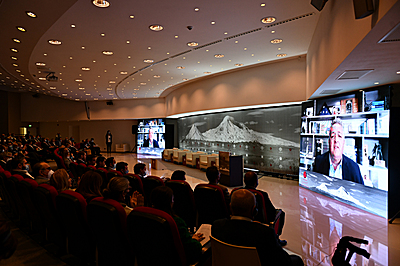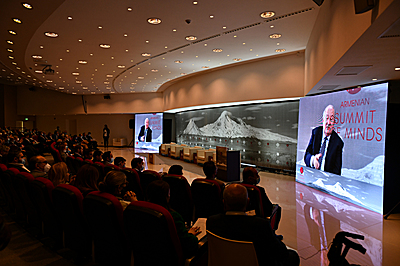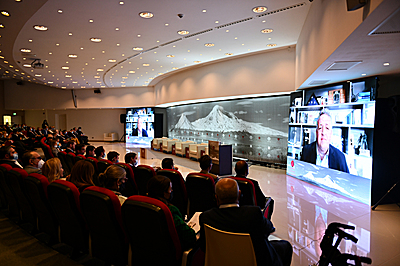Press releases
To solve our problems today, we must work hard and focus on the future. President Armen Sarkissian holds discussion with Noubar Afeyan within the framework of the Third Armenian Summit of Minds
Within the framework of the Third Armenian Summit of Minds in Dilijan,
President Armen Sarkissian held a discussian entitled Talks of the Future with Noubar Afeyan, the Co-Founder and President of the American company Moderna, also the Founder CEO of Flagship Pioneering.
President Armen Sarkissian: I am happy for this discussion, but I am sorry that you could not come to Dilijan to personally attend the Third Armenian Summit of Minds. I hope you will be able to come to the Summit organized with STARMUS next September.
I would like to hear your opinion on several subjects. One of them is the role of innovation. The times have changed. If in the history of science and technology, we have had industrial revolutions, and people used to benefit from those revolutions, in my opinion, now they happen almost every day. But the core of all is innovation. I would like to hear how innovations are transforming the world, and how innovation has transformed. Innovation today and innovation even ten, or twenty years ago, are different.
Noubar Afeyan: First, thank you, Mr. President, for inviting me. I am sorry I am not there in person. All the things that you are doing is quite relevant to my sphere as well.
With the basic definition of innovation being an improvement of a process or a thing that has some usefulness to somebody who consumes it. It has been around for a long time. It is a kind of underlying driver of progress. I would say that it is of the human condition that we innovate and improve. I think that innovation has more and more become a commodity.
There is a base-line level of innovation. What is now changing is that we really need against this base-line innovation breakthrough innovations, things that truly change the arc of possibility in a particular area. And those are, seemingly, unpredictable and kind of random by their very nature.
If you really try thinking about breakthrough innovations, you really need to think future backwards, not present forward, i.e. work on what will happen, not what already exists.
President Armen Sarkissian: What about the COVID? When we say COVID, a lot of us think of you as well, because of the Moderna vaccine. Has the COVID, as a global event, exercised a change on the process of innovation development, helped it, or the other way round?
Noubar Afeyan: I think the pandemic broadly has and will have significant effects on the…
President Armen Sarkissian: It effects as acceleration.
Noubar Afeyan: In a way, it is an accelerator, but it has definitely slowed down the work of certain spheres, even the pharmaceutical industry. Of course, there has been a massive acceleration in the development of vaccines and diagnostics in the fight against the pandemic, as time has begun to fluctuate in different ways due to the loss of human lives. Under pandemic, when thousands of people started dying a day, many said that it was necessary to speed up, to conduct parallel tests, not to wait six months between each step. The bad thing about the pharmaceutical industry is that the clinical trials of other diseases have either slowed down or stopped.
The pandemic has greatly slowed down the medicine preparation and clinical processes. Such pandemics give and take; in this case, I think there has been equal amounts of it.
President Armen Sarkissian: The process of innovation is not classical in this new world, and I prefer to call it quantum. It is quantum because you do not go from A to B, you go to the future, and then, you may be calculating the probability how to reach there with what are possible paths. Of course, innovation in one specific sector is not isolate. This quantum world, or this rapid evolution world, is developing itself not only in biotechnologies, pharmaceuticals, but also in artificial intelligence, IT, and many other sectors.
So, you are in the middle of all this, how do you think these areas work together, how do developments in other areas or other innovations affect your area, biotechnologies, and pharmaceuticals?
Noubar Afeyan: Our innovation methodology, which we described recently, is all based on the notion that you have to create multiple solutions, predict multiple possible states, and then, let them compete, which one ends up being the optimal one. That is the way to make a much more rapid progress, have one solution at a time, and it must be human-centred and design-oriented. In the world we live, humans have become the supreme drivers of the answers, and goal-targeted people are valuable. One of the greatest technological advances, in fact, is artificial intelligence, and machine learning.
President Armen Sarkissian: If you want to understand what is happening in the world of mechanics or quantum mechanics, in biology, which, in essence, again, as you noted, is quantum mechanics, then you need to consider all the possible options. Surely, the same idea can be applied not only in quantum mechanics, biology, and artificial intelligence, but also in our social behaviour.
With my third and last question, I would like to address you as a fellow Armenian.
You live in the Diaspora, and I live in Armenia, a small country, with a much larger Diaspora. We all have a vision or a dream to make Armenia a centre of global innovation. This is the main way for our country to develop, be stronger, and have its contribution in the world. History has shown that Armenia can be very innovative. You are one of the proofs of history that the Armenian mindset can be innovative. And it is more than natural to try making Armenia an innovation centre.
What is the way forward? Will it be classical? Or, we have to think more quantum again to take Armenia from point A, where we are, to the desired point B, where it will be a much stronger centre of innovation.
Noubar Afeyan: I think the smaller you are, the more innovation is your way out.
Our biggest challenge is our mindset. Maybe, we should call this the Summit of Mindsets because there we have a significant conflict, unfortunately. Of course, challenge really has to do with the future.
Let me give you the following example. When people are suffering in the present, it is human nature that they do not think about the future, even though, the solution of the problems of the present are often going to be derived from that future. And unless you make time for the future to somehow intervene with the present, you are stuck in that present; that is something that over the last twenty years of engaging in development projects in Armenia, I have realized that those two mindsets are, unfortunately, contradicting each other. It is natural that living in the Diaspora, Armenians have access to many other mindsets, and they are not suffering the day-to-day difficulties of the country. Therefore, they naturally come up to the issues from that viewpoint.
The question is the following: is a mental and social space possible for such a mindset so that they can maintain their existence and plants can take root in the garden, or will the soil always reject them, based on understandable reasons?
I am not eager to delve into the world of politics, but people elect governments based on what they can do for them today, unfortunately not because of what they do for them tomorrow. And if the only solution for today is to focus on those who are only interested in today, it is very hard to imagine...
President Armen Sarkissian: Politics is the art of promise.
Noubar Afeyan: Unfortunately, these are unrealistic promises about today. These promises can be much more realistic if given some time. But the time usually exceeds the election cycle. So, this is something that as Armenians, we have to go back to our thousands-of-years history, and find a way to sit around the table and say how we get Armenians from wherever they live to believe in the ideal of a revived Armenia and Armenians, and kind of how you merge the possibilities that can come from future backwards thinking. And only then, I think innovation becomes a weapon for advancement, only then can you expect cooperation, and that is the big challenge we all face.
President Armen Sarkissian - I fully agree with you that the solution of today's problems is in the future. And to solve our problems today, we have to be working very hard, and targeting ourselves to the future. Otherwise, if we are stuck only on today, we will never do that. Today is more linked to the past rather than to the future. So, I agree with you, to sort out our issues today, we have to focus on tomorrow, work on tomorrow, develop things for tomorrow.
I also agree with your point that living in Armenia and outside Armenia implies two different mindsets. Living abroad opens opportunities, and new mindsets. That is why, when we speak about Armenia, we can think of two models: one is a closed model that dominates in today's Armenia, and the other one is the open model when we basically work together with the world, and specifically with the Armenian Diaspora.
As President of the Republic, I am working on changing the Constitution, allowing you, dear Nubar, as an Armenian who has an Armenian passport, to come and serve the country any time, bringing with you not only the knowledge and experience you have, but also your mindset, which is global. This is what our country needs.
Noubar Afeyan: I commend you for that, and I think that is an important step. Thousands of people like me have the same idealistic mindset of wanting to have a better Armenian state, but are somewhat limited to what they can do.
A lot of this has also to do with belief. I always tell people that major progress is primarily foremost, an act of leaps of faith, which are primarily based on the belief that when you land in that leap, you are in a better place. That belief feeds on the ability of a person to imagine and believe in what you imagine. If you cannot believe in what you imagine, you will get depressed, and you will not progress.
Therefore, for a country of historically deeply rooted faith, one of the instincts must be to believe in the future. We must find it in our history, and our culture, so that we can again believe in a better future.


